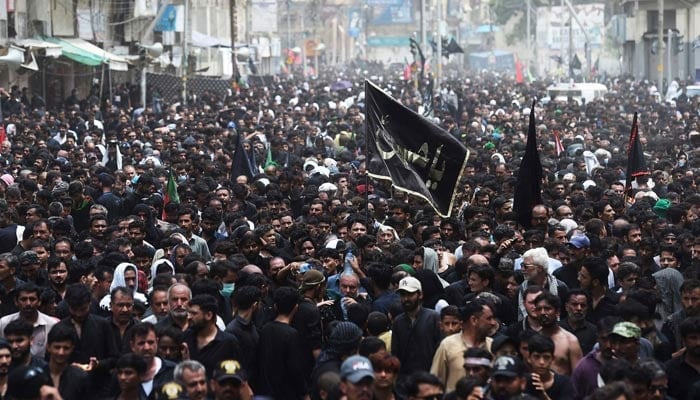Remembering the aftermath
It is no surprise that millions of mourners from across the world will join processions in Karbala on Sunday to remember aftermath of 'Ashura’'
The powerful image of a lone woman held captive, standing in the shadows of 72 severed heads of her family and clan members, is a memory that has failed to fade away even after more than 1300 years. That terrifying scene remains the centrepiece of the remembrance that marks ‘Arbaeen’ or the 40th day after the massacre of Imam Hussain (a.s) and his followers in Karbala, Southern Iraq.
The persona of Bibi Zainab (a.s), the younger sister of Imam Hussain who bravely led the survivors of Karbala to the court of Yazid ibn Muawiya to face him while he celebrated his victory, has sparked a wave of sympathetic reactions over centuries.
So powerful was her defiance against Yazid ibne Muawiya that Bibi Zainab (a.s) continues to evoke some of the most memorable works of prose and poetry today.
It is no surprise that millions of mourners from across the world will join processions in Karbala on Sunday (August 25) to remember the aftermath of ‘Ashura’ – the 10th day of Muharram. In addition to the commemoration across Karbala where the carnage took place, scores of others will visit the shrine of Bibi Zainab (a.s) in Damascus.
The mood across the neighbourhood surrounding her final resting place known as ‘Zainabia’ stands in sharp contrast to the towering Ummayad mosque in another part of Damascus, where Yazid ibn Muawiya held his court and now remains the target of popular scorn.
The contemporary scene in Damascus is a complete reversal of events on that terrible day when the victims captured in Karbala were brought to face Yazid ibn Muawiya. Visitors to the Ummayad mosque today walk in mourning through a nearby bazaar known as ‘Souq e Hamidiya’, where the prisoners were kept waiting for three days, as the court of Yazid ibn Muawiya was prepared to celebrate his victory.
Historians concur that if the sacrifice of Imam Hussain (a.s) in Karbala saved Islam from a speedy downward slide departing from its core values, the subsequent ordeal surrounding the survivors of the carnage only reinforced its memory for all times to come.
Among her personal sacrifices, Bibi Zainab (a.s) saw two of her teenage sons, Hazrat Aun bin Abdullah bin Jaffar bin Abu Talib and Hazrat Muhammad bin Abdullah bin Jaffar bin Abu Talib, ride into battle to be martyred on ‘Ashura’.
The events on ‘Ashura’ are difficult to qualify as a regular battle, as Imam Hussain (a.s) and his followers faced the army of Yazid ibne Muawiya comprising 30,000 or more soldiers. Eventually on ‘Ashura’ there were 71 martyrs including the six-month-old infant Hazrat Ali Asghar (a.s) before Imam Hussain (a.s) was martyred. Their severed heads were presented to Yazid ibn Muawiya as the trophies from the battle.
But to this day, the powerful sermons by Bibi Zainab first in Kufa before Yazid’s appointed regional governor, Obaidullah Ibne Ziyad and then in Damascus as she faced Yazid ibn Muawiya, are widely celebrated for beginning to turn the tide against the ruling empire.
So powerful were her words that Bibi Zainab (a.s) is remembered for inspiring the other captives including Imam Zainul Abideen (a.s), the only adult male among the prisoners and Imam Hussain's son, who was too frail to go into battle on ‘Ashura’.
“The Ummayads [the clan of Yazid ibn Muawiya] believed that marching with the Prophet’s [pbuh] family as prisoners, accompanied by the heads of [the martyrs of Karbala] would raise fear in the hearts of their opponents, and further establish their authority,” wrote Grand Ayatollah Sayyid Mohammed Taqi al-Modarresi in his widely popular account ‘The Truthful Zainab: Sister of al-Hussain’.
“They [Umayads] did not know that the revolution [of Karbala led by Imam Hussain] was planned to be the revolution which proves the superiority of the blood which defeats the sword, and the conscience which defeats benefits and money”, he added.
Ahead of the captives being presented in the court of Yazid ibn Muawiya, the ruling empire went out of its way to ensure attendance by a large number of influential individuals, from representatives of foreign states to the highest-ranking officials. It was here that Bibi Zainab (a.s) spoke eloquently as she outlined the superiority of her clan and the righteous cause of her slain brother and his followers. Her public rebuke of Yazid ibn Muawiya unleashed a powerful message that eventually spread across his empire, provoking unending defiance against his rule.
Writer Catherine Shakdam in her account ‘From Mecca to the plains of Karbala’ cited the sermon of Bibi Zainab (a.s) as being a milestone in this journey. “If you have gained something today by shedding blood, you will certainly be a loser on the day of judgment. On that day, nothing but your deeds will count. On that day you and your followers will quarrel with one another by the side of the divine scale of justice”, wrote Shakdam citing Bibi Zainab (a.s).
As Yazid ibn Muawiya uncomfortably faced Bibi Zainab (a.s), some historians claim that his empire began to crumble almost immediately. After the court appearance in Damascus, even a year-long captivity for the survivors of Karbala failed to strike the fear of the empire upon the victims of Karbala.
Grand Ayatollah al-Modarresi in commending the prisoners led by Bibi Zainab (a.s) wrote; “The words of reprimand and defiance that filled their [survivors of Karbala] speeches, their mockery of Umayyad tyranny and cruel authoritarianism, indeed marked the greatest cultural revolution in the nation”. In effect, the gathering in Damascus where the prisoners from Karbala were presented, became a significant turning point that fueled the failure of Yazid ibn Muawiya’s choice of ordering the massacre in Karbala, and his downfall in time.
The writer is an Islamabad-based journalist who writes on political and
economic affairs. He can be reached at: farhanbokhari@gmail.com
-
 Eric Dane’s Friends Initiate GoFundMe To 'support' His Two Daughters After His Death At 53
Eric Dane’s Friends Initiate GoFundMe To 'support' His Two Daughters After His Death At 53 -
 Internet Erupts After Candace Owens Claims Elon Musk And Sam Altman Are ‘not Human’
Internet Erupts After Candace Owens Claims Elon Musk And Sam Altman Are ‘not Human’ -
 Will Princess Beatrice, Eugenie Stay In Contact With Andrew? Source Speaks Out
Will Princess Beatrice, Eugenie Stay In Contact With Andrew? Source Speaks Out -
 ‘AI Revolution Is Coming Fast & US Has No Clue,’ Bernie Sanders Warns Of Speed Of Disruption
‘AI Revolution Is Coming Fast & US Has No Clue,’ Bernie Sanders Warns Of Speed Of Disruption -
 Hong Kong Touts Stability,unique Trade Advantages As Trump’s Global Tariff Sparks Market Volatility
Hong Kong Touts Stability,unique Trade Advantages As Trump’s Global Tariff Sparks Market Volatility -
 ‘Miracle On Ice’ Redux? US Men Chase First Olympic Hockey Gold In 46 Years Against Canada
‘Miracle On Ice’ Redux? US Men Chase First Olympic Hockey Gold In 46 Years Against Canada -
 Friedrich Merz Heads To China For High Stakes Talks In An Effort To Reset Strained Trade Relations
Friedrich Merz Heads To China For High Stakes Talks In An Effort To Reset Strained Trade Relations -
 Astronauts Face Life Threatening Risk On Boeing Starliner, NASA Says
Astronauts Face Life Threatening Risk On Boeing Starliner, NASA Says -
 Hailey Bieber Reveals How Having Ovarian Cysts Is 'never Fun'
Hailey Bieber Reveals How Having Ovarian Cysts Is 'never Fun' -
 Kayla Nicole Looks Back On Travis Kelce Split, Calls It ‘right Person, Wrong Time’
Kayla Nicole Looks Back On Travis Kelce Split, Calls It ‘right Person, Wrong Time’ -
 Prince William And Kate Middleton Extend Support Message After Curling Team Reaches Olympic Gold Final
Prince William And Kate Middleton Extend Support Message After Curling Team Reaches Olympic Gold Final -
 Nvidia CEO Praises Elon Musk, Calls Him An ‘extraordinary Engineer'
Nvidia CEO Praises Elon Musk, Calls Him An ‘extraordinary Engineer' -
 Shia LaBeouf's Mugshot Released After Mardi Gras Arrest On Battery Allegations In New Orleans
Shia LaBeouf's Mugshot Released After Mardi Gras Arrest On Battery Allegations In New Orleans -
 Timothee Chalamet Felt '17 Again' After Reunion With 'Interstellar' Director Christopher Nolan
Timothee Chalamet Felt '17 Again' After Reunion With 'Interstellar' Director Christopher Nolan -
 Conan O'Brien Speaks First Time After Rob Reiner's Killing
Conan O'Brien Speaks First Time After Rob Reiner's Killing -
 Giant Tortoise Reintroduced To Island After Almost 200 Years
Giant Tortoise Reintroduced To Island After Almost 200 Years




